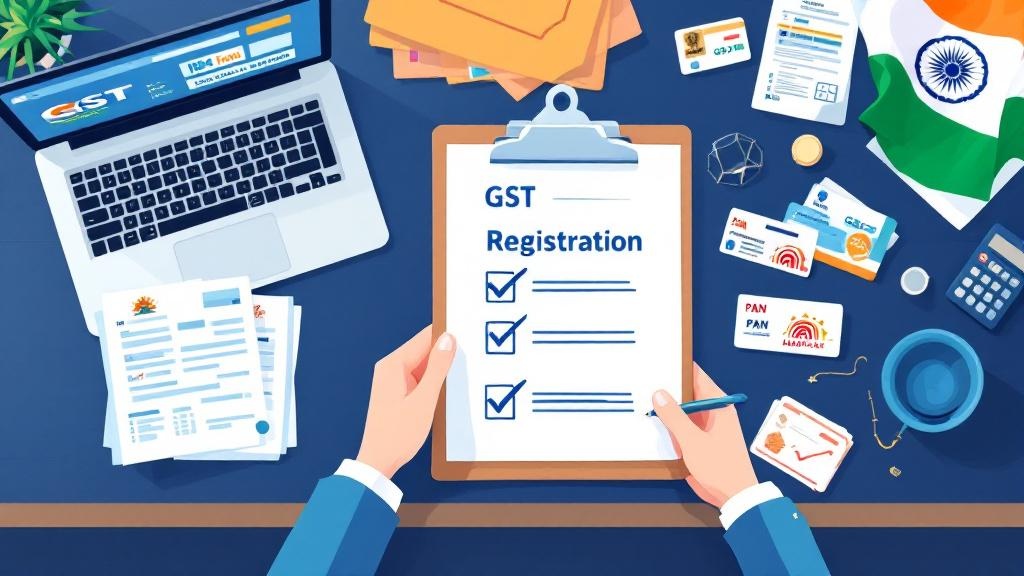The rise of the gig economy and remote work has led to a surge in freelancing across India. Whether you’re a content writer, graphic designer, web developer, or digital marketer, working independently has never been more popular. But with this freedom comes the question of compliance — and one of the biggest queries freelancers have is:
“Is GST registration online mandatory for freelancers in India?”
In this blog post, we’ll break down everything you need to know about GST for freelancers — from registration requirements to compliance tips, and whether you really need to worry about it. Let’s dive in.
What Is GST and Why Does It Matter to Freelancers?
Goods and Services Tax (GST) is a unified indirect tax levied on the supply of goods and services in India. It replaced multiple cascading taxes like VAT, service tax, and excise duty.
Even though freelancers aren’t traditional businesses, the services they offer fall under the scope of GST. This means, under certain conditions, freelancers are required to register for GST and charge it on their invoices.
If you’re unsure about the registration process, platforms like FinTax24 offer convenient online GST registration services, streamlining the entire compliance journey.
Is GST Registration Mandatory for All Freelancers?
Short Answer: No, but it depends on certain factors.
Let’s break it down:
✅ When GST Registration Is Mandatory for Freelancers
-
If your total annual income exceeds ₹20 lakhs
For freelancers offering services within most Indian states, GST registration becomes mandatory if your annual turnover crosses ₹20 lakh.-
For special category states like Himachal Pradesh, Uttarakhand, and the North-Eastern states, the limit is ₹10 lakh.
-
-
If you provide services to clients outside India
Freelancers working with international clients (export of services) must register under GST regardless of turnover. Why? Because export of services is considered a “zero-rated supply” under GST, which makes registration essential to claim tax refunds. -
If you work through online platforms
If you offer services through aggregators like Upwork, Fiverr, or Freelancer.com, GST registration may be mandatory, especially if the platform is classified as an e-commerce operator under GST law.
❌ When GST Registration Is Not Mandatory for Freelancers
If:
-
Your annual income is less than ₹20 lakh (₹10 lakh in special category states), AND
-
You do not provide services internationally, AND
-
You do not use online aggregators for work,
then you are not required to register for GST.
But — even if it’s not mandatory, some freelancers opt for voluntary registration to avail of Input Tax Credit (ITC) and to appear more credible to corporate clients.
Benefits of Voluntary GST Registration for Freelancers
Even if you’re below the threshold limit, voluntarily registering under GST might be a smart move in certain cases. Here’s why:
-
Credibility: Clients, especially corporates, often prefer to work with GST-registered freelancers. It adds professionalism and transparency to your invoices.
-
Input Tax Credit: If you incur GST on software, tools, or professional services, you can claim credit against the tax collected from clients.
-
Smooth Export Processing: If you plan to work with foreign clients or scale internationally, GST registration can simplify the legal formalities for export of services and help you claim refunds on taxes paid.
How to Register for GST Online as a Freelancer
The GST registration process is entirely online through the GST portal. Here’s a simplified overview:
Step-by-Step GST Registration Process:
-
Visit the GST portal: https://www.gst.gov.in
-
Click on “Services” → “Registration” → “New Registration”
-
Fill in the basic details like name, PAN, email, and mobile number
-
Verify with OTP and receive a Temporary Reference Number (TRN)
-
Complete the application by submitting:
-
PAN Card
-
Aadhaar Card
-
Bank account details
-
Proof of address (rental agreement or utility bill)
-
Photograph
-
-
Submit via EVC or Digital Signature Certificate (DSC)
-
Receive your GSTIN (GST Identification Number) and login credentials
If this sounds overwhelming, don’t worry — platforms like FinTax24 make freelancer GST registration online simple and error-free.
What Happens After GST Registration?
Once registered, you’re expected to comply with the following:
1. Issue GST Invoices
Every invoice must include:
-
Your GSTIN
-
Invoice number and date
-
Client details
-
Taxable value and applicable GST rate (usually 18% for most services)
2. File GST Returns
Freelancers must file monthly or quarterly returns depending on the type of registration:
-
GSTR-1 for outward supplies
-
GSTR-3B for summary returns
-
Annual return (if applicable)
3. Collect and Pay GST
You need to charge GST (usually 18%) on your invoices and pay it to the government.
4. Maintain Proper Records
Maintain all invoices, receipts, bank statements, and agreements for at least 6 years as per GST law.
GST Rates Applicable for Freelancers
In most cases, freelance services fall under the 18% GST rate slab. This includes:
-
Content writing
-
Digital marketing
-
Web development
-
Graphic designing
-
IT consulting
However, the exact rate may vary based on the nature of service. Always check with a professional or use trusted platforms like FinTax24 to get accurate classification.
Common Mistakes Freelancers Make with GST
Even well-meaning freelancers can fall into compliance traps. Avoid these common mistakes:
-
Ignoring registration despite crossing threshold
-
Charging GST without having a valid GSTIN
-
Missing return filing deadlines, leading to penalties
-
Not maintaining proper invoice formats
-
Assuming exports are tax-free without registration
Staying informed and organized can save you a lot of headaches down the road.
FAQs About GST for Freelancers
🔹 Is GST applicable if I work with international clients?
Yes, even if the service is zero-rated, you must register and file returns to claim input tax credit or refunds.
🔹 Can I register for GST with my PAN as an individual?
Yes. As a freelancer, you can register under your personal PAN. No need to form a company.
🔹 Can I avoid GST by receiving payments in cash or through UPI?
No. GST is based on the nature of supply and income thresholds — not the payment method.
🔹 What if I don’t register and still collect GST?
That’s illegal. You must not collect GST unless you’re registered. Penalties can apply.
Final Thoughts: Should You Register for GST as a Freelancer?
To sum it up:
-
Mandatory if your income exceeds ₹20 lakh (or ₹10 lakh in special states)
-
Mandatory if you offer services internationally or through online platforms
-
Optional if you’re below the threshold and serve only domestic clients
Even when it’s not legally required, voluntary GST registration can give you long-term benefits, including tax credits, smoother export processes, and enhanced client trust.
As freelancing becomes more professionalized in India, staying on the right side of tax compliance is not just smart — it’s essential.
Need Help with GST Registration?
If you’re still unsure or overwhelmed by the process, consider using FinTax24’s online GST registration services. They specialize in helping freelancers get GST-ready without hassle, so you can focus on what you do best — your freelance work.







Comments (0)